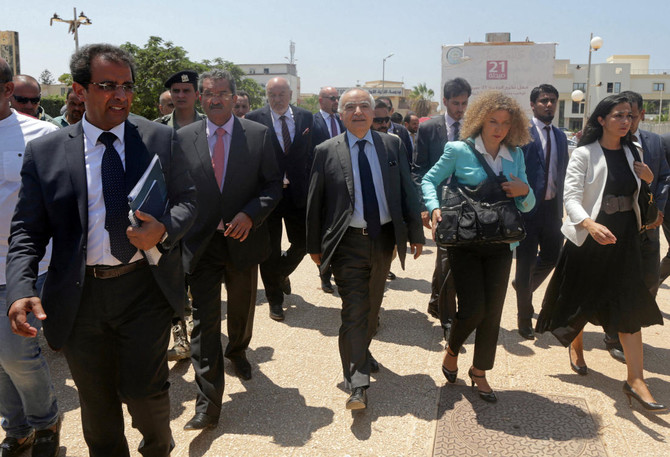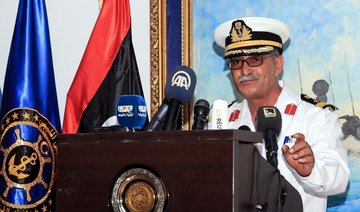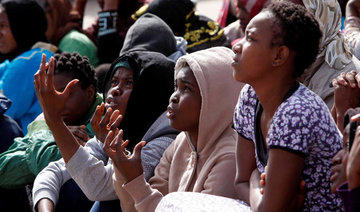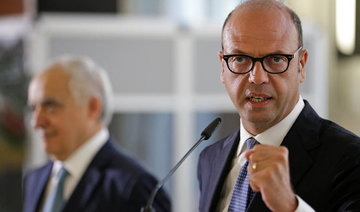NEW YORK: UN children agency UNICEF has warned that more than 500,000 children in Libya need help and called on warring parties to end the violence and negotiate a political solution to the crisis.
Libya has spiraled into turmoil after a civil war ousted Muammar Qaddafi in 2011. Rival brigades of former rebels backed by competing political factions have turned against each other in a fight for control.
A UN-backed government in Tripoli is trying to extend its influence, though it is facing resistance from armed rivals.
Geert Cappelaere, UNICEF regional director, said that 550,000 children need assistance due the political instability, on-going conflict, displacement, and economic collapse.
“The wellbeing of girls and boys in Libya should be a priority for authorities, civil society and the international community,” Cappelaere said in a statement after visiting the country.
UNICEF said nearly 200,000 children in Libya need safe drinking water, while 315,000 need educational support with more than 550 schools in the country either destroyed, damaged or used as shelters.
Cappelaere warned that more than 80,000 children are internally displaced and migrant children in Libya are particularly vulnerable to abuse and exploitation, including in detention centers.
In a report in May, UNICEF said that thousands of unaccompanied children attempting to make it across the Mediterranean from Libya to Italy can become easy prey for traffickers who often sell them into exploitation, sometimes akin to contemporary forms of slavery.
UNICEF’s concern came as a migrant rescue organization said it was racing to the aid of anti-immigration activists whose boat had run into trouble in the Mediterranean.
The C-Star, which has vowed to expose what it describes as “collaboration” between privately-funded rescue ships and people traffickers, said on Twitter it had “developed a minor technical problem during the night,” leaving it adrift but not in distress.
Germany’s Sea-Eye, one of nine NGOs involved in migrant search and rescue (SAR) operations and a target of the C-Star’s campaign, said it had been “asked by the MRCC (command center in Rome) to assist the ship.”
The Italian coast guard could not be reached for a comment.
The C-Star has been plagued with problems since its mission began last month. It was initially refused permission to travel through the Suez Canal, before later being blocked over legal questions in Cyprus.
After finally making it to Libya’s SAR zone, it needed to refuel but found itself stuck off the coast of Tunisia earlier this week after fishermen and a powerful Tunisian union refused to allow passage.
French activist Clement Galand sent a message to AFP overnight Thursday to Friday saying the boat “has been refueled, everything is fine, we will return to the search and rescue zone” off Libya.
But by Friday morning the activists said a technical problem had forced them to turn off the ship’s engine and inform other vessels in the area.
The ship has been off the radar on maritime traffic sites since Wednesday. Galand said the ship was currently “between Malta and the Libyan coast.”
The 40-meter long ship, which is flying under a Mongolian flag, is leased by the far-right group “Generation Identity.”
Funded by Internet-collected donations of more than $212,000, the Austrian, French, German and Italian activists on board have vowed to ensure migrants rescued at sea off Libya be returned to Africa.
Two NGO ships were badgered at sea by the C-Star last week with a radio message telling them to “leave the rescue zone” and “stop acting as an incentive for human traffickers.”
The message echoed one transmitted on Thursday by the Libyan navy, which has banned any unauthorized foreign ships from entering the SAR zone off its coast.
More than half a million children in Libya need help: UNICEF
More than half a million children in Libya need help: UNICEF

Gaza ceasefire enters phase two despite unresolved issues

- Under the second phase, Gaza is to be administered by a 15-member Palestinian technocratic committee operating under the supervision of a so-called “Board of Peace,” to be chaired by Trump
JERUSALEM: A US-backed plan to end the war in Gaza has entered its second phase despite unresolved disputes between Israel and Hamas over alleged ceasefire violations and issues unaddressed in the first stage.
The most contentious questions remain Hamas’s refusal to publicly commit to full disarmament, a non-negotiable demand from Israel, and Israel’s lack of clarity over whether it will fully withdraw its forces from Gaza.
The creation of a Palestinian technocratic committee, announced on Wednesday, is intended to manage day-to-day governance in post-war Gaza, but it leaves unresolved broader political and security questions.
Below is a breakdown of developments from phase one to the newly launched second stage.
Gains and gaps in phase one
The first phase of the plan, part of a 20-point proposal unveiled by US President Donald Trump, began on October 10 and aimed primarily to stop the fighting in the Gaza Strip, allow in aid and secure the return of all remaining living and deceased hostages held by Hamas and allied Palestinian militant groups.
All hostages have since been returned, except for the remains of one Israeli, Ran Gvili.
Israel has accused Hamas of delaying the handover of Gvili’s body, while Hamas has said widespread destruction in Gaza made locating the remains difficult.
Gvili’s family had urged mediators to delay the transition to phase two.
“Moving on breaks my heart. Have we given up? Ran did not give up on anyone,” his sister, Shira Gvili, said after mediators announced the move.
Israeli Prime Minister Benjamin Netanyahu said efforts to recover Gvili’s remains would continue but has not publicly commented on the launch of phase two.
Hamas has accused Israel of repeated ceasefire violations, including air strikes, firing on civilians and advancing the so-called “Yellow Line,” an informal boundary separating areas under Israeli military control from those under Hamas authority.
Gaza’s Hamas-run health ministry said Israeli forces had killed 451 people since the ceasefire took effect.
Israel’s military said it had targeted suspected militants who crossed into restricted zones near the Yellow Line, adding that three Israeli soldiers were also killed by militants during the same period.
Aid agencies say Israel has not allowed the volume of humanitarian assistance envisaged under phase one, a claim Israel rejects.
Gaza, whose borders and access points remain under Israeli control, continues to face severe shortages of food, clean water, medicine and fuel.
Israel and the United Nations have repeatedly disputed figures on the number of aid trucks permitted to enter the Palestinian territory.
Disarmament, governance in phase two
Under the second phase, Gaza is to be administered by a 15-member Palestinian technocratic committee operating under the supervision of a so-called “Board of Peace,” to be chaired by Trump.
“The ball is now in the court of the mediators, the American guarantor and the international community to empower the committee,” Bassem Naim, a senior Hamas leader, said in a statement on Thursday.
Trump on Thursday announced the board of peace had been formed and its members would be announced “shortly.”
Mediators Egypt, Turkiye and Qatar said Ali Shaath, a former deputy minister in the Ramallah-based Palestinian Authority, had been appointed to lead the committee.
Later on Thursday, Egyptian state television reported that all members of the committee had “arrived in Egypt and begun their meetings in preparation for entering the territory.”
Al-Qahera News, which is close to Egypt’s state intelligence services, said the members’ arrival followed US Middle East envoy Steve Witkoff’s announcement on Wednesday “of the start of the second phase and what was agreed upon at the meeting of Palestinian factions in Cairo yesterday.”
Shaath, in a recent interview, said the committee would rely on “brains rather than weapons” and would not coordinate with armed groups.
On Wednesday, Witkoff said phase two aims for the “full demilitarization and reconstruction of Gaza,” including the disarmament of all unauthorized armed factions.
Witkoff said Washington expected Hamas to fulfil its remaining obligations, including the return of Gvili’s body, warning that failure to do so would bring “serious consequences.”
The plan also calls for the deployment of an International Stabilization Force to help secure Gaza and train vetted Palestinian police units.
For Palestinians, the central issue remains Israel’s full military withdrawal from Gaza — a step included in the framework but for which no detailed timetable has been announced.
With fundamental disagreements persisting over disarmament, withdrawal and governance, diplomats say the success of phase two will depend on sustained pressure from mediators and whether both sides are willing — or able — to move beyond long-standing red lines.














